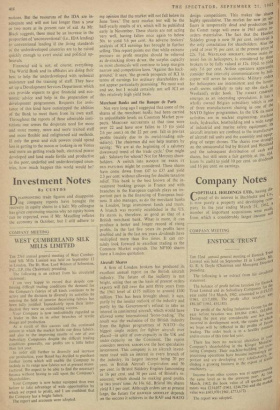Investment Notes
By CUSTOS
DisApPoiNTtNG trade figures and disappoint- ing company reports have brought the recovery in equity shares to a halt. My colleague has given convincing reasons why no equity boom can be expected, even if Mr. Maudling reflates the economy in October, but I still adhere to my opinion that the market will not fall below its June 'lows.' The next market test will be the half-yearly results of ICI, which will be published early in November. These shares are not acting very well, having fallen once again to below 50s. to yield 5.6 per cent. An adverse brokers' analysis of ICI earnings has brought in further selling. This report points out that while extreme pressure on profit margins should be relieved as de-stocking slows down, the surplus capacity in most chemicals will continue to keep margins narrow and competition keen. 'Against this back- ground,' it says, 'the growth prospects of ICI in terms of earnings for ordinary shareholders do not appear particularly promising.' We must wait and see, but I would certainly not sell ICI on this relatively high yield basis.
Merchant Banks and the Banque de Paris
Not very long ago I suggested that some of the shares of the merchant banks had been carried to unjustifiable levels on Common Market pros- pects. MERCURY SECURITIES at that time were over 22 and have now fallen to 15 (to yield 2.6 per cent.) on the 22 per cent. fall in pre-tax profits (mainly due to its metal-trading sub- sidiary). The chairman did not help matters by
saying: 'We are at the beginning of a salutary downward trend of the trade cycle.' One might ask : Salutary for whom? Not for Mercury share-
holders. A switch into BANQUE DE PARIS ET DES PAYS-BAS might be considered. These shares
have come down from £47 to £37 and yield 2.3 per cent. without allowing for double taxation relief. This bank is the best known of the in- vestment banking groups in France and with branches in the European capitals plays an im- portant part in the financing of European busi- ness. It also manages, as do the merchant banks in London, large investment funds and trusts. A branch was recently established in the US. Its status is, therefore, as good as that of a British merchant bank. What is more, it can produce a better and longer record of rising profits. In the last five years its profits have doubled and in the last ten years dividends have multiplied more than live times. It can cer- tainly look forward to excellent trading as the Common Market expands. The NF100 shares have a London quotation.
Aircraft Shares A firm of London brokers has produced its excellent annual report on the British aircraft industry. The future of the industry is not bright, seeing that on the basis of present orders exports will fall over the next three years from
the 1961 level of £175 million to around £100 million. This has been brought about, it says, partly by the insular outlook of the industry and partly by the Government's refusal to take an interest in continental aircraft. which would have allowed some international 'horse-trading.' The result was the exclusion of the British industry from the fighter programmes of NATO---the biggest single orders for fighter aircraft ever placed—in spite of over-capacity in the UK and under-capacity on the Continent. The report considers BRISTOL AEROPLANE the best speculative investment. This company is an aircraft invest- ment trust with an interest in every branch of the industry, its largest interest being 20 per cent. in British Aircraft Corporation and 50 per cent. in Bristol Siddeley Engines (amounting to 16 per cent. and 38 per cent. of Bristol's re- sources), which should be making good profits in two years' time. At 16s. 6d., Bristol 10s. shares yield 8.1 per cent. Although orders are at present large, the future for HAWKER SIDDELEY depends on the success it achieves in the RAF and NATO
design competitions. This makes the shares highly speculative. The market for new jet air- liners is temporarily dead and production for the Comet range will cease in 1963 unless re- orders materialise. The fact that the Hawker
Siddelev group is now 50 per cent. industrial Is the only consolation for shareholders. Also the yield of over 91 per cent. at the present price of 22s. 71d. WESTLAND AIRCRAFT, whose main in- terest lies in helicopters, is considered by these brokers to be fully valued at 12s. 101d. to Yield only 5.6 per cent. Airline operators apparently consider that inter-city communications by belt- copter will never be economic. Military orders for helicopters are intermittent and the hove.f- craft seems unlikely to take up the slack In Westland's order book. The FAIREY COMPANY emerges as an interesting speculation. It has a wholly owned Belgian subsidiary which is one of three manufacturers sharing in one of the NATO fighter programmes. In the UK its math activities are in nuclear engineering, machine tools, hydraulics, boatbuilding and a wide range of industrial and marine safety equipment. Its aircraft interests are confined to the manufacture of aircraft tail units and the assembly and equip- ping of target drones. The shares rose strongly on the unsuccessful bid by Bristol and Westland and the subsequent distribution of cash and , shares, but still seem a fair gamble at I6s. 4-7n. (cum Is. cash) to yield 10 per cent. on dividends and 16 per cent. on earnings.










































 Previous page
Previous page